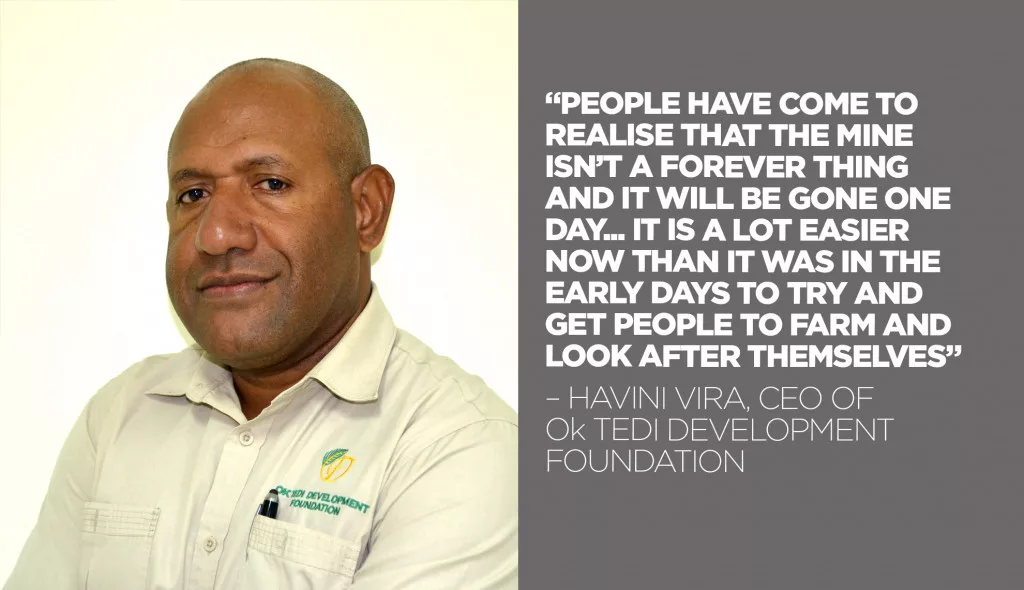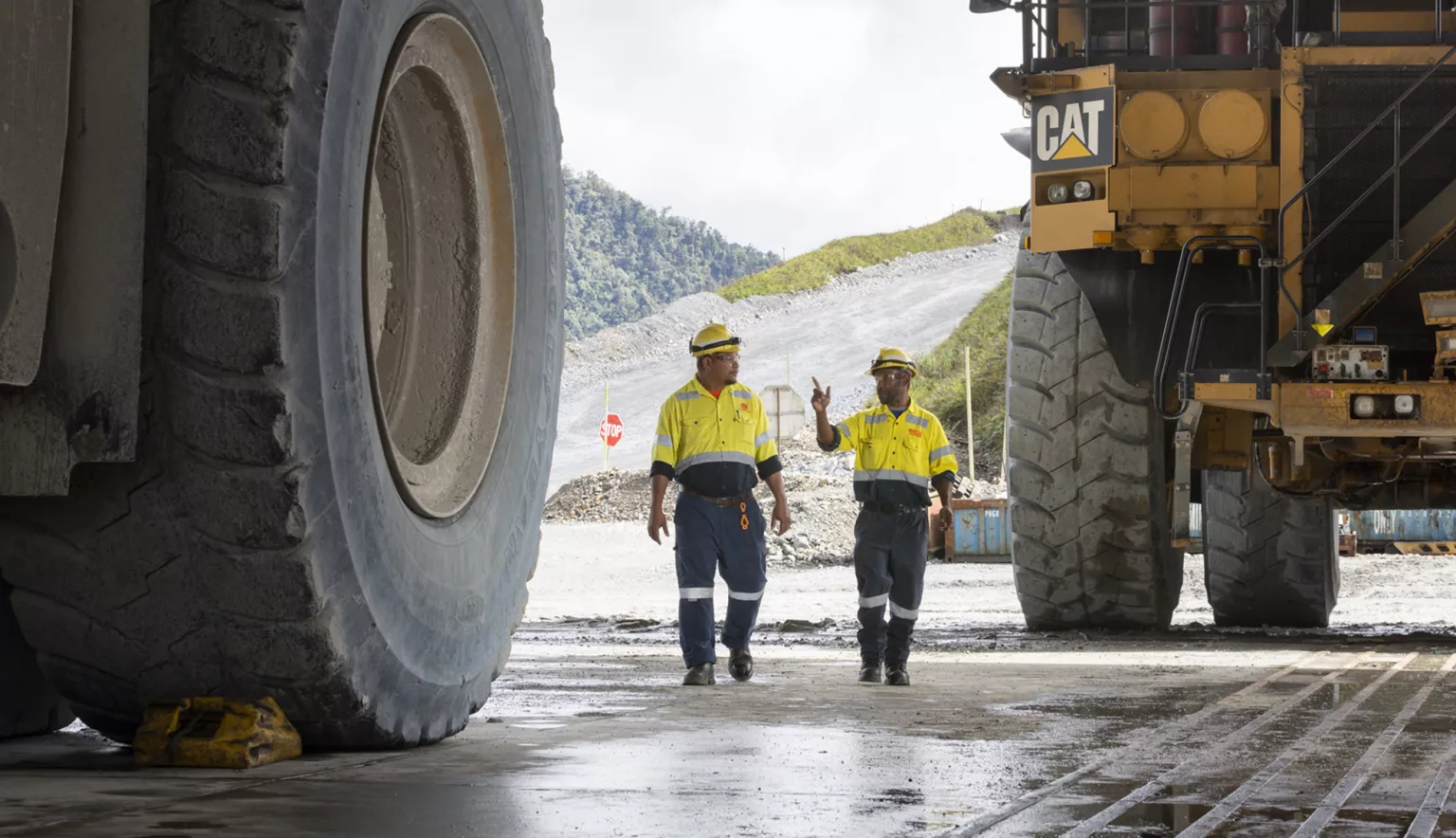SUPPORT OPERATIONS
Ok Tedi’s location is based in a geographically remote area of Western Province which is surrounded by a challenging terrain. As a result of the remote location of the mineral resource, as well as the low levels of settlement before the establishment of the mine, OTML built the township of Tabubil to support the operations.
Tabubil provides the infrastructure required to support the mine, including an airport, workshops, warehouses, housing, banks, schools and medical facilities. Tabubil Hospital provides support for the six local aid posts in the mine-affected areas such as Finalbin, Bultem, Migalsim, Sisimakam, Ok Ma and Atemkit. The town has sealed roads, gutters and kerbs, power, reticulated water, sewage and garbage collection. The majority of the accommodation is in the form of detached high-set housing and camp facilities for Fly-in Fly-out (FIFO) workers.
PROVIDING WORLD CLASS HEALTHCARE
Since mining began in 1984, OTML has been the primary provider and financial supporter of private and public health services throughout the Western Province. The firm works closely with various multi-sectoral stakeholders for the provision of health services. These include the Fly River Provincial Health Department, a number of church-based providers, NGOs and private health providers.
Providing access to world-class health services for the community and OTML’s workforce is a key priority. As such, OTML owns Tabubil Hospital, which is an accredited five-star facility under the PNG Department of Health system. The hospital is mainly funded by OTML, with a contribution from the Fly River Provincial Government. The hospital provides services to the communities in the North Fly District and Telefomin District and is renowned as the Western Province’s referral hospital.
As a teaching hospital, the hospital provides medical care and services to OTML employees and dependents, contractor employees and the general public. The hospital also offers a practical field for academic and clinical training programmes of the Faculty of Health Sciences of the Divine Word University, while also conducting medical research to provide input into Biomedical and Health Sciences research within PNG.
Ok Tedi has committed PGK20 million to help PNG curb the escalating COVID-19 cases within the country. In March 2021, OTML General Manager for Community and Operations Support, Kedi Ilimbit, confirmed the announcement and said that OTML’s commitment demonstrates the company’s seriousness in overcoming PNG’s escalating COVID-19 situation.
Ilimbit added that PGK10 million would be given to the Port Moresby General Hospital as well as other agencies determined by the National Government while the other PGK10 million will be leveraged for the procurement, distribution and roll-out of the COVID-19 vaccine in the Western Province, with priority given to the OTML workforce, contractors and residents.
“We will be working closely with the Sustainable Development Programme and the Western Province Health Authority to implement the COVID-19 vaccine roll-out plan in the Western Province.
“Ok Tedi remains fully committed to take the lead and join forces with the Government, and other relevant agencies to address this pandemic that is impacting all of us. Our commitment demonstrates the same duty of care we have for our employees, to be extended to other Papua New Guineans, including our people of Western Province.”
POWER
Ok Tedi is the largest power user in the Western Province, producing its power from both hydro and thermal generation. Power for the Ok Tedi operations is generated by a combination of hydroelectric and thermal power generation units, in order to meet the average and peak demand for some 63 megawatts (MW) and 70 MW respectively.
The hydroelectric generation consists of the main 56 MW power station at Ok Menga and the 2.4 MW station at Yuk Creek. The Tabubil thermal power station includes a combination of diesel-powered reciprocating engines and turbines with a total combined installed capacity of 63 MW to supplement the hydroelectric generation and meet the balance of the power demand. Smaller thermal generation units are also located at Bige, Kiunga and other outstations.
WATER
Process water is pumped from the Dablan Creek pumping station near Tabubil through a large diameter steel pipeline and a number of pump stations that are used to transfer the water up to the mountain range to the mill. Recycled process water is also used in the processing plant.
SUPPLY AND LOGISTICS
Supply and logistics mobilise around 4,000 twenty-foot equivalent containers and 100 megalitres of diesel every year. Freight and concentrate material are transported between Port Moresby, Brisbane and Kiunga by the OTML shipping fleet on the Fly River. These vessels are owned by five different entities. Five of the vessels are managed by P&O Maritime, and a single vessel each contracted from Consort Express Lines, Curtain Brothers and Puma Energy.
Goods are then loaded on Ok Tedi’s constructed and maintained public gravel road between Kiunga and Tabubil and then onto the mine, utilising a fleet of prime movers, tankers and trailers.
OTML is dependent on adequate water levels being maintained in the Fly River to allow shipping movements to transport copper concentrate from Kiunga to the silo vessel and, upon return, provide fuel, supplies and other consumables for the operation.
Airports are located at Tabubil, Kiunga and Bige where OTML has scheduled charter flights to move FIFO employees and contractors to and from work. Ok Tedi currently charters Dash 8 and Twin Otter aircrafts to uplift freight on an as-required-basis, further supporting operations. A helicopter supports exploration activity as well as environmental, community relations and security operations.
ASSET MANAGEMENT
Ok Tedi operates and maintains a modern mobile equipment mining fleet and ancillary equipment. OTML also operates and maintains fixed/processing plants and equipment in the processing plant and Kiunga operations, which has been active for more than 30 years. During this time, there have been significant equipment component changes and upgrades done to the existing plants. There is continuous planned maintenance to maximise equipment reliability and to meet production targets.





































